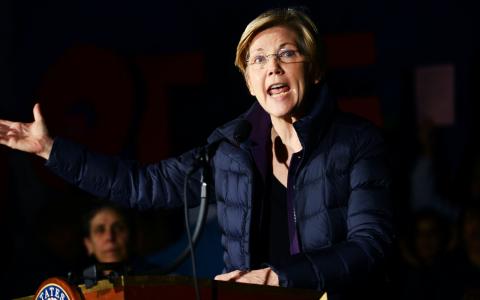
(Reuters) Wall Street bank lobbyists are seeking moderate Democratic allies in Congress to deprive Elizabeth Warren of votes and curb policies they consider hostile to their interests, according to more than a dozen lobbyists, consultants and campaign data.
A leading Democratic 2020 presidential hopeful and fiery progressive, Warren has built her profile by attacking lenders like Wells Fargo & Co, Goldman Sachs Group Inc and Citigroup Inc.
Banks worry that even if the Massachusetts senator does not become the next U.S. president, she would wield major influence on financial policy in any Democratic administration.
“While a hostile White House could pose challenges, the banking industry is working to mitigate those challenges by using its considerable clout in Congress,” said Cam Fine, chief executive of advocacy consultancy Calvert Advisors and a longtime bank lobbyist.
On the campaign trail, Warren has proposed measures damaging for Wall Street, including breaking up big banks, taxing financial transactions, and reviving capital and liquidity rules weakened by the Trump administration.
She has also rejected corporate money, closing off a traditional avenue for influencing presidential candidates.
Lobbyists believe they can rely on Congressional Republicans to oppose Warren’s agenda, but they need to sway moderate Democrats to block any drastic legislation, especially in the Senate where most bills require 60% of the vote to pass.
Thirty-five Senate seats are up for re-election in 2020 and the winning party is expected to wield only a slim majority.
Banks are targeting Democrats on the U.S. Senate banking committee who need war chests for re-election bids, including Virginia’s Mark Warner and Alabama’s Doug Jones, as well as other senators with bipartisan track records such as Arizona’s Kyrsten Sinema and Michigan’s Gary Peters, lobbyists said.
Some Democrats, including Peters, have received more cash from banks this cycle than leading Republicans like Senate Majority Leader Mitch McConnell, according to data from the Center for Responsive Politics.
“Elizabeth has a proven record of getting things done, even in the face of intense lobbying from corporate interests,” said a spokeswoman for Warren.
Warner declined to comment. Jones and Sinema did not respond to requests for comment.
A spokeswoman for Peters said he had helped lead efforts to hold Wall Street accountable and protect consumers, and would “continue to focus on doing what’s best for Michigan families, Main Street community banks and credit unions.”Of the $5.8 million that banks and their lobby groups have given to lawmakers’ campaigns so far this election cycle, 33% has gone to Democrats, the highest portion since 2010, the data shows.
“You can’t get lasting legislation done in this city without it being bipartisan,” said Tom Quaadman, an executive vice president at the U.S. Chamber of Commerce which this year said it would better reward lawmakers who focus on bipartisanship.
“That’s why we are making sure we have strong ties with both parties.”
The American Bankers Association, the biggest bank group donor which has dished out $1.5 million so far this cycle, also plans to fund campaign ads in support of moderate Republicans and Democrats in tight races, the sources said.
An ABA spokesman declined to comment.
ECONOMIC ROLE
Media savvy and a consumer finance expert, Warren has proved adept at wrongfooting big banks, shining a spotlight on their missteps and slamming regulators she says are too industry-friendly. Beyond blocking legislation, banks need advocates who will rebut Warren’s rhetoric, shield regulators from White House pressure to crackdown on them, and moderate the tone in Washington, the sources said.
Lobbyists are also courting lawmakers on the U.S. House of Representatives’ finance panel, such as Ohio’s Joyce Beatty, and those from districts with a significant financial footprint, including New York’s Gregory Meeks, Georgia’s David Scott and Connecticut’s Jim Himes.
The Financial Services Forum representing the eight largest U.S. banks has decided to give directly to lawmakers for the first time. In meetings, it has used data on bank lending and employment to emphasize the large role banks play in lawmakers’ constituencies and the broader economy, its CEO Kevin Fromer said in an interview.
The message is resonating with some lawmakers.
“To say ... banks are the evil people of the world would go against the interests of the communities I represent,” Meeks told Reuters.
He said he wants banks to operate fairly, but that Warren’s proposals to curtail the industry could reduce banking services in minority communities like those he represents in New York’s Queens borough. “We talk because I’d like banks to also invest in communities like mine,” he added.
Beatty, Scott and Himes did not respond to requests for comment.
Warren has argued that lax bank regulation can harm minorities, while vigorously defending rules that guard against discriminatory and predatory lending.
“This campaign is about building a grassroots movement of Democrats, Republicans, and Independents to hold Wall Street accountable and to produce an economy that works for everyone,” said Warren’s spokeswoman.
Wall Street has struggled since the 2007-2009 global financial crisis to rehabilitate its image in Washington and rebuild the Democratic support it once enjoyed. Some lobbyists are skeptical they will gain much ground. Many, though, said they have been encouraged by signs of a thaw after the industry in 2018 persuaded a group of moderate Democrats to back a rewrite of post-crisis rules, despite intense criticism from Warren.
“The industry is much more attuned to the political cycle this go-around,” said one consultant.



